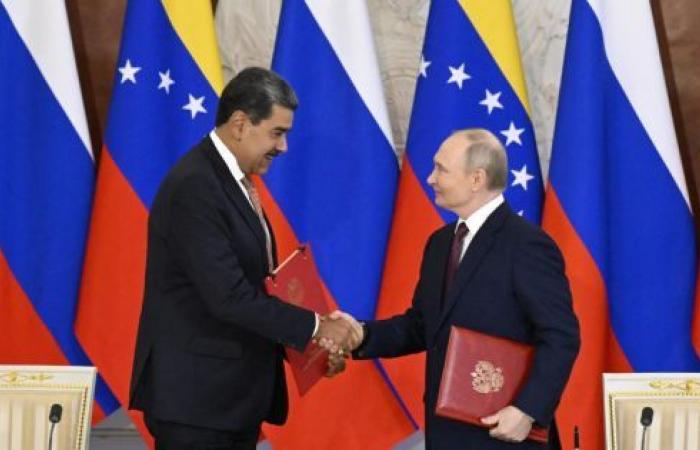
Venezuela seeks support in Russia and China in the midst of an increasingly deep economic crisis
Friday, May 9, 2025 – 15:09 UTC
While Venezuela seeks support in Moscow and Beijing, the internal economic situation deteriorates rapidly. Inflation could reach 200% in 2025
Venezuela uses its geopolitical allies, Russia and China, to face a growing economic crisis marked by the fall in oil revenues, uncontrolled inflation and the accelerated depreciation of its currency.
President Nicolás Maduro sealed a series of energy and economic cooperation agreements with his Russian counterpart, Vladimir Putin, during a visit to Moscow this week. “The commercial balance between Moscow and Caracas increased 64% by 2024 and has the prospects of continuing to grow,” Putin said during the meeting. The Venezuelan state media described the new agreements as a “strategic association” that will cover areas such as hydrocarbons, finance, air connections, technology, pharmacy, military cooperation and security, and that will remain in force for the next 10 years.
The Venezuelan Chancellor, Yván Gil, highlighted the dimensions of the agreement, stating that “it is the first time that a Latin American country signs a treaty of this caliber with Russia.” Dimitri Peskov, spokesman for Kremlin, also highlighted the importance of the agreement, qualifying it as “a framework of weight, substantial and very important.”
Meanwhile, the Venezuelan vice president Delcy Rodríguez traveled to Shanghai, where she met with executives of the National Petroleum Corporation of China (CNPC) to discuss possible investments in the Venezuelan oil sector. CNPC, who had abandoned its operations in Venezuela in 2020, is now re -evaluating its role in the country.
China has historically been a key financial support for Venezuela, providing billions of dollars in loans during the era of Hugo Chávez. However, many of these projects were affected by corruption and poor management, which led Beijing to reduce its investment in recent years. Despite this, the Chinese government has maintained its diplomatic support to Caracas.
While Venezuela seeks support in Moscow and Beijing, the internal economic situation deteriorates rapidly. Inflation could reach 200% in 2025, according to Asdrúbal Oliveros, director of the Ecoanalitic firm. The official exchange rate has collapsed, and the dollar is now quoted to 91 bolivars, compared to 69 in the end of March. Chevron’s departure from the country has reduced oil revenues by approximately 50%, according to Oliveros.
“Venezuela faces a new period of significant economic deterioration, and the main injured will be the ones who depend on a salary in Bolivars: senior citizens and public employees,” said Oliveros in an interview with Unión Radio.
The agreements with Russia and China arrive at a time when Venezuela seeks to stabilize their collapsed economy without the support of US companies. Although the government promotes the diversification of non -oil exports, the country continues to depend largely on foreign investment to maintain its crude oil production.
Despite the optimistic tone of ads with Moscow and Beijing, reality in Venezuela is still gloomy. Analysts warn that, without a broader political solution, the country’s economic problems will hardly be solved.





